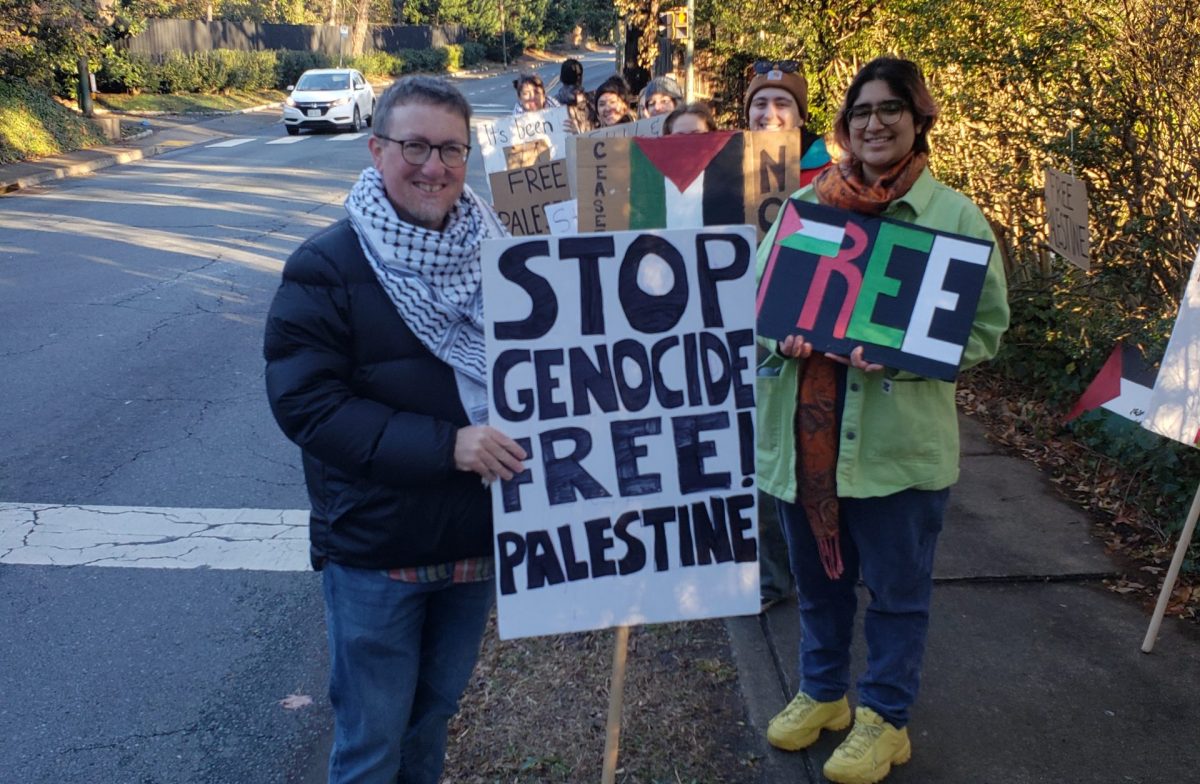As the number of Palestinian lives lost from the conflict in Gaza climbs to over 20,000, according to the Palestinian Ministry of Health, voices addressing the crisis are louder than ever. Local activist Jason Crane is one of them.
Since October 24, Crane has held a vigil every weekday morning on the corner of Rugby Road and Rugby Avenue in observance of the loss of Palestinian life. Like hundreds of thousands of Americans, Crane wanted to acknowledge the unfolding crisis in the region, so, with a homemade sign reading “Stop Genocide, Free Palestine,” he walked to the busiest street corner accessible to him, and made it a daily ritual.
Crane says for the first week or two, he held the vigil alone. Then someone saw one of his daily posts on Instagram and joined him the next morning. A neighbor who saw him while driving by decided to stop and participate as well. Crane says there are now about 50 people who attend off and on. On November 9, a similar vigil gathered in front of the Northrop Grumman building on Route 29, and has continued from 4 to 5pm every Friday.
According to the Crowd Counting Consortium, a public service project that tracks non-violent protests, the majority of demonstrations in the United States expressed solidarity with Israel in the first 10 days following the October 7 attack by Hamas, with 270 recorded compared with nearly 200 in support of Palestine. But as the war continued, the nation saw a massive surge of support for Palestine. On November 28, CCC recorded 1,869 events showing solidarity for Palestine compared to 433 in support of Israel since October 7.
“The belief that Israel is committing genocide in Gaza appears to be an important factor in the growth of this movement,” writes Jay Ulfelder, program director of Harvard’s Nonviolent Action Lab, on the CCC blog.
“For me this is a daily show of solidarity,” says one attendee of the Charlottesville-area vigils. “What’s important is that we show people we’re still out there and remind people that this is still happening.”
Crane says their presence every day is helping those who feel the same way know that they are not alone, one of his primary motivations for holding the vigil.
“The way that I know that, is people do things like pull over and hand us a tray of muffins, or bring us coffee,” Crane says. “A very elderly woman came with a box full of pastries from Albemarle Baking Company, and she handed them out to us.”
But there are also the hecklers.
“The number-one reaction, far outstripping every other reaction, is apathy,” Crane says. “It’s just people who barely look at us or look and look away. Number two is positive, and there are a lot of positive reactions. And a distant third is negative, people who flip us off or yell.”
Sixty-one percent of Americans support a permanent ceasefire in the region, according to a poll conducted by Data for Progress and published December 5. The poll found that 74 percent of those surveyed support sending food, water, and medical aid to the people of Gaza. 49 percent support sending military aid to Israel, while 38 percent oppose it.
Though the U.S. has long been a staunch ally of Israel, President Joe Biden said the country was losing international support by its “indiscriminate bombing” of the area. Israeli airstrikes continue across Gaza, including the southern city of Rafah. More than 50,000 Palestinians have been injured, 300,000 residences destroyed, and 26 out of the area’s 35 hospitals are not functioning, according to data collected by Al Jazeera.
Yet the U.S. has vetoed three U.N. resolutions calling for an immediate end to hostilities in the region. Fifth District Representative Bob Good expressed “unequivocal support” for the war in Gaza during a December 20 pro-Israel event at the Fluvanna County Public Library.
On the topic of popular support for a permanent ceasefire, the congressman said, “the only solution for Israel is to eradicate and defeat Hamas to ensure [an attack] cannot happen again.” Good supported a $14.3 billion aid package for Israel that passed in the House at the beginning of November.
From Crane’s vantage, however, the vast majority of people are in favor of peace.
“I’ve been really heartened by the number of people who support us,” Crane says. “I think it’s not a hard concept to understand that genocide is bad. And I think we afford [people] a very small chance each morning to say that out loud in some way.”
